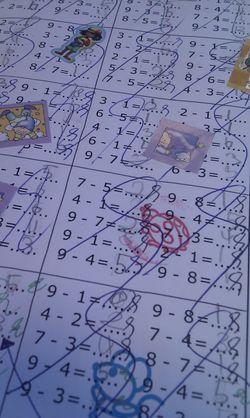Dyscalculia
Dyscalculia is the medical term for experiencing severe difficulty in making mathematical calculations, for instance struggling to add up numbers or making more mistakes in math than in the past.[1][2] Dyscalculia is the result of a physical brain condition.[2] Dyscalculia is a cognitive symptom and is more common in people with severe M.E.[3]
Presentation[edit | edit source]
Dyscalculia in ME/CFS and Fibromyalgia[edit | edit source]
People with chronic fatigue syndrome were found to have difficulty even when adding up single digit numbers, a poor working memory and information processing contributed to the difficulties with numbers.[1] Dyscalculia in ME/CFS is more severe than that found in depression, and occurs in people with ME/CFS who do not have depression.[1] ME/CFS and fibromyalgia patients report having trouble with arithmetic.
Prevalence[edit | edit source]
- 1995, Katrina Berne, PhD, reported a prevalence of 75-80% for 'aphasia' (inability to find the right word, saying the wrong word) and/or dyscalculia (difficulty with numbers) - although she notes that this symptom is probably underreported and more prevalent than indicated.[4]
- 2001, In a Belgian study, 71.6% of patients meeting the Fukuda criteria and 75.1% of patients meeting the Holmes criteria, in a cohort of 2073 CFS patients, reported a difficulty with calculations.[5]
Symptom recognition[edit | edit source]
Research studies[edit | edit source]
- 2013, Cognitive impairments associated with CFS and POTS[1] - (Abstract)
Possible causes[edit | edit source]
Potential treatments[edit | edit source]
Learn more[edit | edit source]
See also[edit | edit source]
- Aphasia
- Cognitive dysfunction
- Dysphasia
- Memory problems
- Word-finding problems
- List of symptoms in ME/CFS
References[edit | edit source]
- ↑ 1.0 1.1 1.2 1.3 Shanks, Lindzi; Jason, Leonard A.; Evans, Meredyth; Brown, Abigail (May 16, 2013). "Cognitive impairments associated with CFS and POTS". Frontiers in Physiology. 4. doi:10.3389/fphys.2013.00113. ISSN 1664-042X. PMC 3655280. PMID 23720636.
- ↑ 2.0 2.1 "Medical Definition of DYSCALCULIA". Merrian-Webster Dictionary. Retrieved November 15, 2018.
- ↑ "UK Charity for Myalgic Encephalomyelitis What is ME?". investinme.org. Retrieved November 15, 2018.
- ↑ Berne, Katrina (December 1, 1995). Running on Empty: The Complete Guide to Chronic Fatigue Syndrome (CFIDS) (2nd ed.). Hunter House. p. 59. ISBN 978-0897931915.
- ↑ De Becker, Pascale; McGregor, Neil; De Meirleir, Kenny (December 2001). "A definition‐based analysis of symptoms in a large cohort of patients with chronic fatigue syndrome". Journal of Internal Medicine. 250 (3): 234–240. doi:10.1046/j.1365-2796.2001.00890.x.


